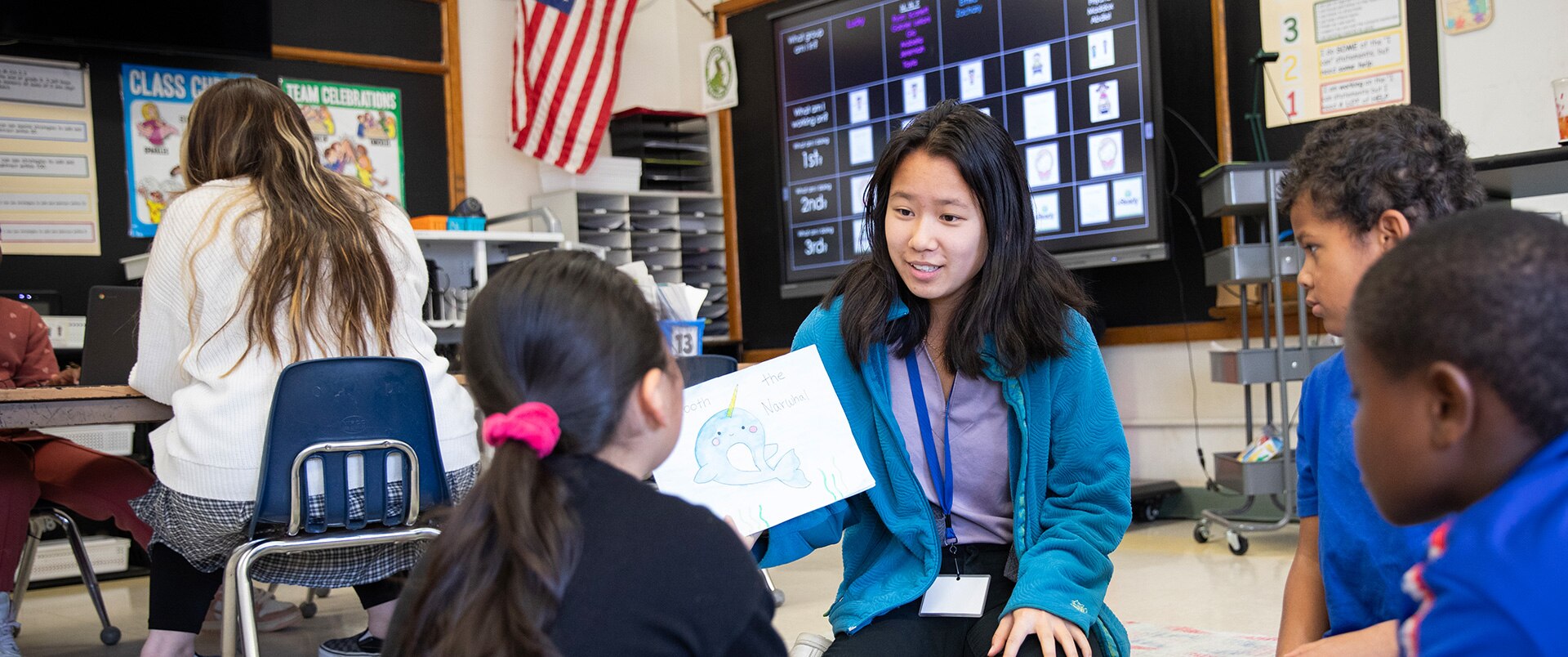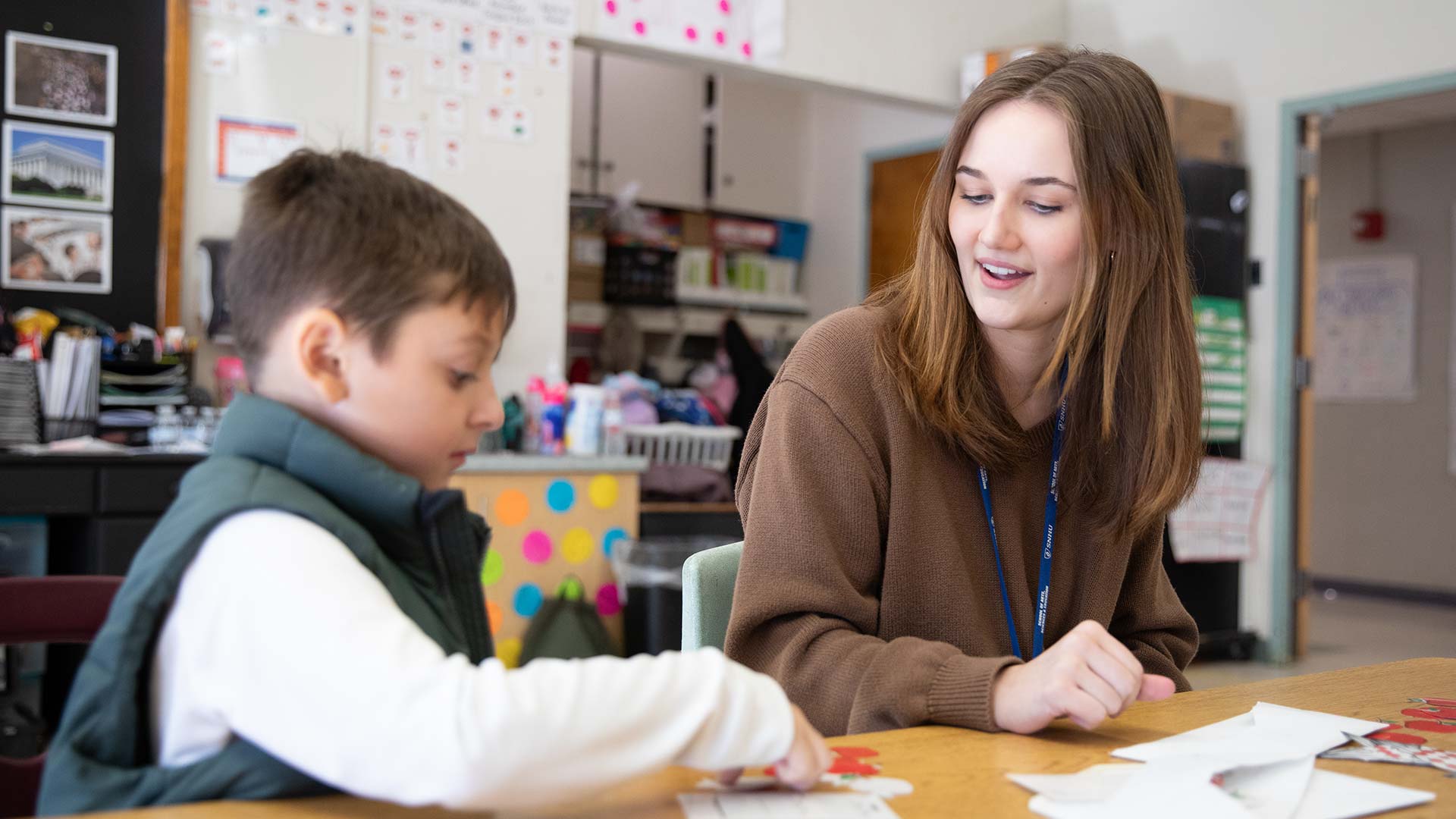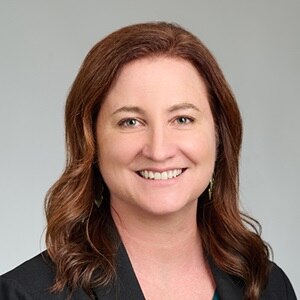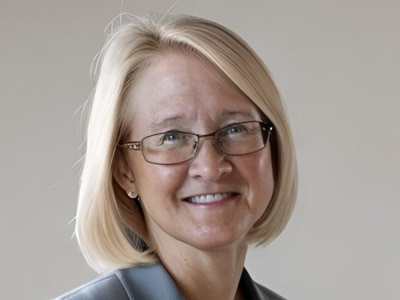MEd Dual Certification Elementary Education & Special Education New England field-based learning

Program Overview Why get a master's degree in elementary and special education?
Learn how you can shape the next generation with a Master of Education (MEd) in Elementary and Special Education from Southern New Hampshire University. Here, you could gain the skills – and professional licensure – needed to jumpstart your teaching career.
This campus-based program helps prepare you for New Hampshire state licensure in elementary education (K-6) and general special education (K-12) by combining theory with hands-on, practical experience in real classrooms. At SNHU, you'll also develop project-based learning activities and work directly with elementary students during an immersive summer learning program.
Skills you'll learn:
- Developmentally appropriate learning experiences
- Scientifically based instructional strategies
- Special education law's influence on professional practice
- Reading, language and math development practices
- Use of technology in student learning and achievement
- Methods and materials for teaching social studies and science

Courses & Curriculum Develop your pedagogy with field-based elementary and special education courses
The courses in our MEd program are designed to provide you with the tools you need to educate and shape the next generation of learners. Through hands-on experiences and research-based learning, you'll gain the skills, competencies, knowledge and disposition to support students in elementary and special education classrooms. And with 4 clinical experiences, you'll have the chance to apply what you learn to make a real difference in students' lives.
The master's in elementary and special education is a full-time, competency-based iterative program totaling 36 credits. Here, you'll complete 44 weeks of clinical experiences in the span of 13 months. Students are required to complete the Teacher Certification Program (TCP) Application during the Gateway I. This includes successful completion of ECE 609, SPED 501C, EDU 616, criminal background check and passing PRAXIS CORE scores.
Objectives & Outcomes
This program is approved by the New Hampshire State Department of Education for Teacher Certification as leading to an endorsement in New Hampshire. Southern New Hampshire University cannot guarantee licensure, certification, endorsement or salary benefits. View Disclosure information.
Learn from instructors with industry experience
Our faculty members bring with them decades of knowledge and experience in elementary and special education, which informs the development of SNHU’s courses and curriculum. They look forward to supporting your journey both in the classroom and as you work toward a career in your field.
Andrea Campbell
Position
Assistant Director, Field-based Graduate Education Programs
Joined SNHU
2018
Education
- MEd in Elementary Education and General Special Education from Southern New Hampshire University
- BS in Environmental Science from the University of New Hampshire
Andrea Campbell serves as the assistant director of field-based graduate education programs in Southern New Hampshire University's School of Arts, Sciences and Education. She previously worked as the professional development school liaison at SNHU before transitioning to her current role. Campbell has over a decade of experience as a teacher in the Bedford school district, building her skills in the classroom that she brings to her work with students at SNHU.
Campus major courses
You’ll take major courses that provide you with a solid foundation in your area of study – in some cases featuring experiential or project-based learning opportunities, labs, simulations and internships. These courses will allow you to learn a wide variety of topics and help prepare you for a role in your desired field.
Courses may include:
Visit the course catalog to view the full MEd Dual Certification in Elementary Education and Special Education curriculum.
Can't wait? You don't have to!
Whether you’re looking to continue your education locally or traveling across the world to experience SNHU, you can apply now. We can’t wait to meet you!
Have questions? Visit our Contact Us page.
Next term starts:
June 29, 2026
Career Outlook What can I do with an elementary and special education degree?
In the field of elementary and special education, there are many ways to work with children – or even adults. After completing this program, you could go on to work in industries such as education or corporate training, using your pedagogical, management and assessment skills to develop both students and employees.
Career paths include:
- Elementary teacher
- Special education teacher
- Training and development specialist
Openings projected each year for kindergarten and elementary school teachers through 2033, according to the U.S. Bureau of Labor Statistics (BLS).1
Median annual salary nationally for kindergarten and elementary school teachers in May 2023, according to the BLS.1 Statistic not based on wage data for SNHU graduates.
Understanding the numbers
When reviewing job growth and salary information, it’s important to remember that actual numbers can vary due to many different factors—like years of experience in the role, industry of employment, geographic location, worker skill and economic conditions. Cited projections are based on Bureau of Labor Statistics data, not on SNHU graduate outcomes, and do not guarantee actual salary or job growth.
School of Arts, Sciences and Education Learn about the School of Arts, Sciences and Education
From understanding why people behave the way they do, to studying and tackling today's environmental issues, the School of Arts, Sciences and Education serves as an academic hub for creativity, collaboration and learning. Here, you'll have the chance to gain real-world experience through internships, student teaching, lab work and community-based projects. From studying cells under a microscope or analyzing crime scenes to leading a student-teaching session in an elementary classroom, you’ll learn how the world works so you can help make it a better place.
Student teaching opportunities
Inkwell game design studio
State-of-the-art labs
Hear from us

We offer a dynamic range of programs designed to support your career advancement through transformative educational experiences. Our offerings provide practical, hands-on learning, professional networking opportunities and a strong sense of community fostered by our cohort model.
Audrey Rogers, Associate Dean, Graduate Education Programs
Accreditations
SNHU is accredited by the regional accreditor the New England Commission of Higher Education (NECHE). The university also carries specialized accreditations for some programs.
Graduate Education for Licensure Programs
The School of Arts, Sciences and Education at Southern New Hampshire University is granted accreditation at the initial licensure level by the Council for the Accreditation of Educator Preparation (1140 19th St NW, Suite 400 Washington, DC 20036; 202-223-0077). Additional information regarding the programs covered under this accreditation and the accountability measures can be found on our CAEP Accreditation page.


Sources & Citations
1Bureau of Labor Statistics, U.S. Department of Labor, Occupational Outlook Handbook, on the internet, at https://www.bls.gov/ooh/education-training-and-library/kindergarten-and-elementary-school-teachers.htm (viewed Oct. 11, 2024). Cited projections may not reflect local or short-term economic or job conditions and do not guarantee actual job growth.


